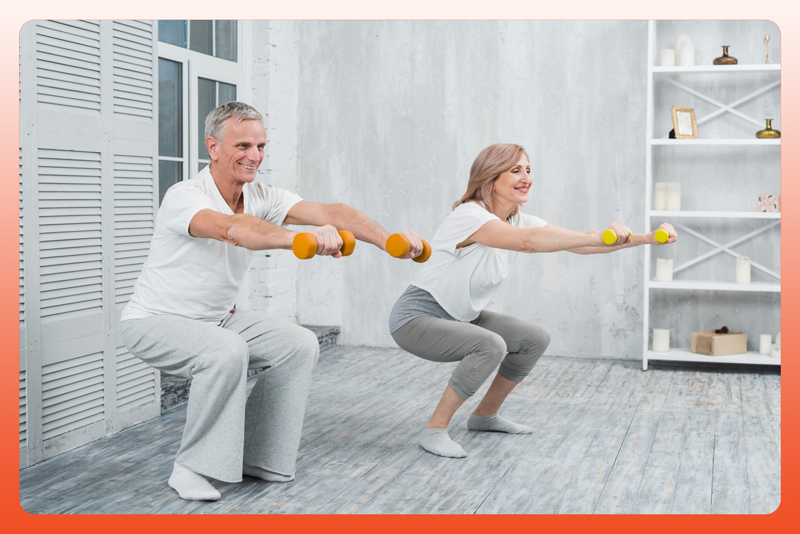Embracing a Healthier Lifestyle: Senior Wellness Tips for the Post-Christmas Season
The festive season is a time of joy, indulgence, and spending quality moments with loved ones. However, as the Christmas lights dim and the holiday decorations are put away, it’s important for seniors to focus on their well-being. Embracing a healthier lifestyle post-Christmas season is essential to ensure vitality and overall health. This article will explore senior wellness tips encompassing staying active, enjoying nutritious meals, and prioritizing self-care. Let’s embark on a journey to enhance senior well-being during this time of transition.
Staying Active After Christmas
The post-Christmas season presents an opportunity for seniors to continue enjoying life to the fullest. While the holidays bring moments of relaxation and indulgence, it’s equally important to prioritize staying active and maintaining a sense of vitality. As we explore this crucial aspect of senior wellness, we’ll delve into various strategies and activities that can help you embark on a journey of post-holiday rejuvenation.
The Importance of Mobility and Vitality
Maintaining mobility and vitality is not just about physical health; it’s also about ensuring a high quality of life. The holiday season often involves extra relaxation and indulgence, which can lead to a more sedentary lifestyle. Seniors should recognize the importance of staying active to counteract this trend.
Regular physical activity offers a wide range of benefits:
- Physical Health: Exercise helps keep your muscles and joints in good condition, reducing the risk of stiffness and discomfort.
- Mood Enhancement: Engaging in physical activity triggers the release of endorphins, which are natural mood lifters.
- Mental Well-Being: Staying active supports cognitive function and can reduce the risk of cognitive decline.
- Social Interaction: Participating in group activities or exercise classes can provide opportunities for socializing and building connections.
- Independence: Maintaining mobility and strength is essential for seniors to continue living independently.
Simple Exercises for Seniors
Now that we understand the importance of staying active let’s explore some simple yet effective exercises that can easily become a part of your daily routine. These exercises are designed to improve mobility, balance, and overall well-being. Remember to consult with a healthcare professional before starting any new exercise program, especially if you have underlying health conditions.
- Daily Walks: A brisk walk around your neighborhood or a nearby park is an excellent way to get your heart rate up and enjoy the fresh air.
- Stretching Routines: Gentle stretching exercises help maintain flexibility and reduce the risk of muscle stiffness. Consider yoga or basic stretching routines.
- Chair Exercises: For those with limited mobility, chair exercises can be highly effective. These seated workouts can improve strength and circulation.
- Balance Exercises: Balance is crucial for preventing falls. Try standing on one foot for a few seconds, gradually increasing the duration as your balance improves.
- Water Aerobics: If you have access to a pool, water aerobics is a low-impact exercise that provides resistance while being gentle on the joints.
Incorporating Physical Activity into Your Routine
Making physical activity a regular part of your daily routine is the key to long-term success. Here are some tips to help you stay active after Christmas:
- Set Realistic Goals: Start with achievable goals and gradually increase intensity and duration.
- Find a Buddy: Exercise can be more enjoyable when shared with a friend or family member.
- Create a Schedule: Plan your exercise sessions just like you would any other appointment.
- Stay Hydrated: Drink plenty of water to stay hydrated, especially during exercise.
- Listen to Your Body: Pay attention to your body’s signals and adjust your activity level accordingly.
- Celebrate Small Wins: Acknowledge your progress and celebrate your achievements, no matter how small they may seem.
Nutritious Post-Holiday Meals

After the indulgence of the holiday season, it’s time to transition towards balanced and nutritious meals that support senior health. The post-Christmas period is an excellent opportunity to refocus on your dietary choices and ensure that you’re nourishing your body with the right foods. In this section, we’ll explore the importance of balanced eating and offer practical tips for making mindful choices when it comes to nutrition.
The Importance of a Balanced Diet
A balanced diet plays a pivotal role in senior wellness, offering a myriad of benefits:
- Nutrient Intake: It provides essential nutrients that your body needs to function optimally, including vitamins, minerals, and antioxidants.
- Energy Levels: Balanced eating helps maintain steady energy levels throughout the day, reducing fatigue and supporting daily activities.
- Weight Management: It assists in weight management, which is important for overall health and mobility.
- Digestive Health: A diet rich in fiber promotes healthy digestion and reduces the risk of gastrointestinal issues.
- Mood and Cognitive Function: Proper nutrition supports brain health and can enhance mood and cognitive function.
Elements of a Balanced Diet
So, what does a balanced diet for seniors look like? Here are some key elements to consider when planning your meals:
- Fruits and Vegetables: Aim to fill half your plate with colorful fruits and vegetables. These foods are rich in vitamins, minerals, and fiber.
- Whole Grains: Choose whole grains like brown rice, whole wheat pasta, and oats over refined grains. They provide sustained energy and fiber.
- Lean Proteins: Include sources of lean protein such as poultry, fish, beans, and tofu in your meals. Protein supports muscle health and helps repair tissues.
- Dairy or Dairy Alternatives: Dairy products or fortified dairy alternatives are essential for calcium and vitamin D intake, crucial for bone health.
- Healthy Fats: Incorporate sources of healthy fats like nuts, seeds, avocados, and olive oil in moderation. These fats support heart health.
- Hydration: Staying hydrated is essential, especially for seniors. Aim for at least eight glasses of water per day. Herbal teas and diluted fruit juices can also contribute to your fluid intake.
Practical Tips for Healthy Eating
Transitioning to a balanced diet after the holidays doesn’t have to be daunting. Here are some practical tips to help you make mindful food choices:
- Meal Planning: Plan your meals ahead of time to ensure they are well-balanced.
- Portion Control: Pay attention to portion sizes to avoid overeating.
- Mindful Eating: Practice mindful eating by savoring each bite and listening to your body’s hunger cues.
- Regular Meals: Aim for regular mealtimes to establish a routine and maintain energy levels.
- Variety: Incorporate a variety of foods into your diet to ensure you receive a wide range of nutrients.
- Limit Processed Foods: Reduce the consumption of processed foods high in added sugars, salt, and unhealthy fats.
Self-Care for Seniors
The post-Christmas season can sometimes bring about feelings of post-holiday blues. Seniors need to prioritize self-care to maintain mental and emotional well-being. Engaging in activities you enjoy, practicing mindfulness, and staying socially connected with loved ones can all contribute to a positive mindset. Don’t hesitate to seek support or counseling if needed.
Prioritizing Mental and Emotional Well-Being
In addition to these activities, here are some key self-care practices for seniors:
- Stay Active: Regular physical activity can boost your mood and reduce stress. Even light exercises like walking or gentle yoga can make a significant difference.
- Maintain a Routine: A daily routine can provide a sense of stability and purpose. Include activities you enjoy and that promote relaxation.
- Connect with Loved Ones: Spending time with family and friends, whether in person or through virtual meetings, can provide emotional support and combat loneliness.
- Practice Mindfulness: Mindfulness meditation or deep-breathing exercises can help reduce anxiety and improve overall well-being.
- Seek Professional Help: If you find yourself struggling with feelings of sadness or anxiety, don’t hesitate to reach out to a mental health professional for support and guidance.
Senior Fitness Routines

As seniors age, their fitness needs may change. Consider incorporating exercises specifically designed for older adults into your routine. Tai Chi, yoga, and water aerobics are excellent options that promote balance, flexibility, and strength. Consult with a healthcare professional or fitness instructor to create a personalized fitness plan that suits your needs.
Tailored Exercises for Well-Being
Here are some fitness tips for seniors:
- Warm-Up and Cool-Down: Always begin and end your exercise sessions with a warm-up and cool-down to prevent injuries.
- Strength Training: Include strength-training exercises to maintain muscle mass and bone density. Use light weights or resistance bands.
- Balance and Flexibility: Focus on activities that improve balance and flexibility to prevent falls and maintain mobility.
- Listen to Your Body: Pay attention to your body’s signals. If an exercise causes pain or discomfort, stop and consult with a professional.
- Stay Consistent: Regular exercise is key to reaping the benefits. Aim for at least 150 minutes of moderate-intensity aerobic activity per week.
Read More: 8 Healthy Changes Seniors Should Make in Their Lifestyle
Mindful Eating for Senior
Mindful eating involves savoring every bite and being present during meals. It can help seniors make healthier food choices, control portion sizes, and prevent overeating. During the post-Christmas season, practicing mindful eating can be especially beneficial in maintaining a balanced diet.
Enjoying Meals with Awareness
Here are some mindful eating tips for older adults:
- Eat Slowly: Take your time to chew and savor each bite. Put your utensils down between bites.
- Listen to Your Hunger Cues: Pay attention to your body’s hunger and fullness signals. Stop eating when you’re satisfied, not overly full.
- Mindful Grocery Shopping: Make a shopping list and stick to it. Avoid buying unhealthy or impulse snacks.
- Meal Planning: Plan your meals ahead of time, including balanced options, to avoid making unhealthy choices when you’re hungry.
- Remove Distractions: Eat at a designated dining area without distractions like TV or smartphones. This helps you focus on your meal.
By incorporating these practices into your daily life, you can enhance your well-being during the post-Christmas season and throughout the year. Self-care, fitness routines, and mindful eating are all essential components of a healthy and fulfilling senior lifestyle.
Conclusion
Embracing a healthier lifestyle in the post-Christmas season is a valuable gift you can give yourself as a senior. By staying active, enjoying nutritious meals, and prioritizing self-care, you can enhance your well-being and continue to savor the moments that matter most. Remember, a healthy lifestyle is a lifelong journey, and it’s never too late to start. So, let’s welcome the post-Christmas season with open arms and a commitment to senior wellness.

